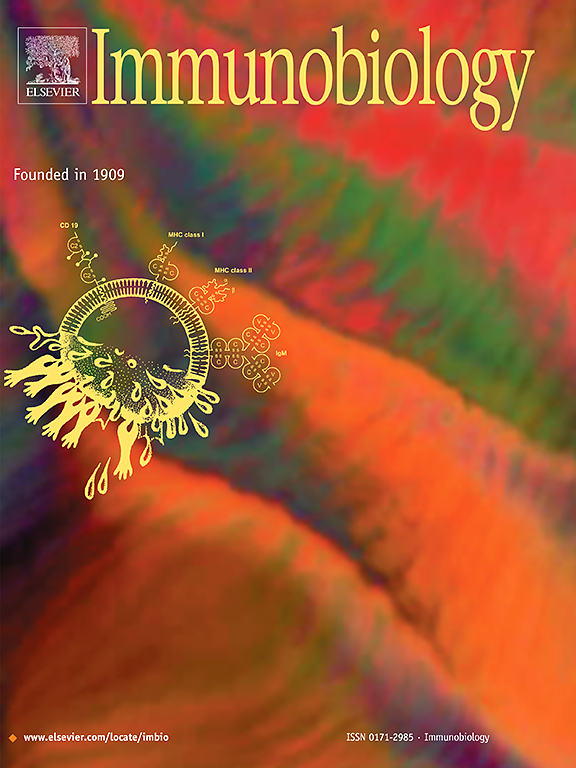M2-like macrophage-derived exosomes inhibit osteoclastogenesis via releasing miR-1227-5p
IF 2.3
4区 医学
Q3 IMMUNOLOGY
引用次数: 0
Abstract
Macrophages play a pivotal role in regulating inflammatory response in periodontitis, a condition characterized by excessive osteoclast differentiation. This study aimed to investigate whether exosomes derived from M2 macrophages regulate osteoclast differentiation and to identify the underlying molecular mechanisms. Exosomes were isolated from M2 macrophages and used to treat osteoclasts. Osteoclastogenesis was assessed using tartrate-resistant acid phosphatase staining and reverse transcription-quantitative polymerase chain reaction (RT-qPCR). The molecular mechanism was evaluated using microarray analysis, RT-qPCR, dual-luciferase reporter analysis, and RNA pull-down assay. The results showed that exosomes from M2 macrophages inhibited receptor activator of nuclear factor κ-B ligand (RANKL)-induced osteoclast differentiation. Additionally, miR-1227-5p expression in osteoclasts was increased after treatment with exosomes, and inhibition of miR-1227-5p counteracted the suppressive effects of exosomes on osteoclastogenesis. Moreover, OSCAR is a target of miR-1227-5p. In conclusion, exosomal miR-1227-5p suppresses osteoclast differentiation, potentially via targeting OSCAR. These findings provide new insights into the pathogenesis of periodontitis.
m2样巨噬细胞来源的外泌体通过释放miR-1227-5p抑制破骨细胞的发生。
巨噬细胞在调节牙周炎炎症反应中起关键作用,牙周炎是一种以破骨细胞过度分化为特征的疾病。本研究旨在探讨来自M2巨噬细胞的外泌体是否调节破骨细胞的分化,并确定其潜在的分子机制。从M2巨噬细胞中分离外泌体,用于治疗破骨细胞。采用抗酒石酸酸性磷酸酶染色和逆转录定量聚合酶链反应(RT-qPCR)评估破骨细胞的发生。采用微阵列分析、RT-qPCR、双荧光素酶报告基因分析和RNA下拉实验对其分子机制进行了评估。结果表明,M2巨噬细胞外泌体对核因子κ-B配体受体激活因子(RANKL)诱导的破骨细胞分化具有抑制作用。此外,外泌体处理后,miR-1227-5p在破骨细胞中的表达增加,抑制miR-1227-5p抵消了外泌体对破骨细胞发生的抑制作用。此外,OSCAR是miR-1227-5p的靶点。总之,外泌体miR-1227-5p可能通过靶向OSCAR抑制破骨细胞分化。这些发现为牙周炎的发病机制提供了新的见解。
本文章由计算机程序翻译,如有差异,请以英文原文为准。
求助全文
约1分钟内获得全文
求助全文
来源期刊

Immunobiology
医学-免疫学
CiteScore
5.00
自引率
3.60%
发文量
108
审稿时长
55 days
期刊介绍:
Immunobiology is a peer-reviewed journal that publishes highly innovative research approaches for a wide range of immunological subjects, including
• Innate Immunity,
• Adaptive Immunity,
• Complement Biology,
• Macrophage and Dendritic Cell Biology,
• Parasite Immunology,
• Tumour Immunology,
• Clinical Immunology,
• Immunogenetics,
• Immunotherapy and
• Immunopathology of infectious, allergic and autoimmune disease.
 求助内容:
求助内容: 应助结果提醒方式:
应助结果提醒方式:


